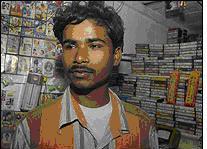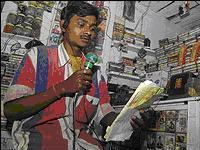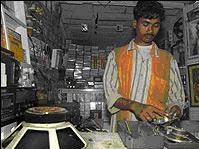Punishment and reward
Hajipur genius replays Kalidas story!
BI Mirror Correspondent
Prison to textbook is the tale of genius not recognised and genius recognised. An illiterate and poor Hajipur man in his 20s was jailed because his ‘Raghav radio’ had no licence to air programme. The money was the impediment. And the same Raghav has carved out a niche in the textbook.Now class 12 students all over the country will read his saga. The story of ‘Raghav Radio’ has been published by the National Council of Educational Research and Training (NCERT) in its book, Bharat Mein Samajik Parivartan Evam Vikas (social changes and development in India) for plus 2 students.
The Raghav radio had not only entertained villagers but also promoted social messages on polio, AIDS and other issues. The Hajipur police, however, had arrested him for illegally running a radio station. But, that was not the end of his mission. The incident rather opened up a new vista for him Impressed by his talent and struggle, the Barefoot College at Tilonia in Ajmer district of Rajasthan has appointed Raghav to head Barefoot Community Radio Station, the first of its kind in that that state.
The Raghav radio station was operating like a community radio service. People in a radius of 20 kms in Muzaffarpur, Vaishali and Saran districts, listened to local news and views in their own dialect. Apart from Hindi songs it gave news about local functions and festivals. The radio also gave information about literacy initiatives and news about missing people. And all that was free of cost.The NCERT book describes Raghav as a role model for development in society. It highlighted the struggle and agonies he faced after starting ‘Raghav Radio station’ in Mansoorpur village in Vaishali district. During a recent visit to his home town, a beaming Raghav hoped that his “story in the NCERT book will inspire people, particularly the youths, to make a difference in society”. The book mentions Raghav as being born in a family of agricultural labourers, which was too poor to give him education. The seeds of an unusual dream were sown in 1997 when Raghav joined a local repair shop as a ‘tenia’ (trainee errand boy). When the shop-owner left the area, Raghav, son of a cancer-ridden farm worker, took over the shack with his friend in 2003. By now the ‘tenia’ had learned art and craft of radio mechanics. And the FM Raghav radio was born the next year in his thatched house (taken on rent), close to his electronics repair shop at Gudri Bazar near Mansoorpur. With the old tools and gadgets that he had stored over the years, he launched his radio station that very soon became a hit with the villagers.
Once Raghav recalled that “it took a long time to come up with the idea and make the kit which could transmit my programme at a fixed radio frequency”.
The transmission kit was fitted on to an antenna attached to a bamboo pole on a neighbouring three-storey hospital building. A long wire connected the contraption to a creaky, old homemade stereo cassette player in Raghav’s radio shack. Three other rusty, locally made battery-powered tape recorders were connected to it with colourful wires and a cordless microphone. The young man, who lived in a shack with his family, didn’t know that running a FM radio station requires a government licence.
After the crackle of static, a young, confident voice floated up the radio waves. “Good morning! Welcome to Raghav FM Mansoorpur 1! Now listen to your favourite songs”, announced anchor and friend Sambhu into a cello-tape-plastered microphone surrounded by racks of local music tapes. For the next 12 hours, the radio station would entertain villagers. “Women listen to my station more than men”, Raghav recalled. “Though Bollywood and local Bhojpuri songs were staple diet, I aired devotional songs at dawn and dusk for women and old people”, he said.
The media highlighted his success story. That was, however, beginning of his ordeals. The Union communications ministry took note of this innovative mission in 2006 and that was his undoing. The ministry sought a report on the legality of the private radio station. Raghav did not possess an operating licence as he was too poor to pay the licence fee and too naive to understand that it was illegal. The Raghav Radio closed down for violating the Indian Telegraphs Act.
The government found him an offender and arrested him for a brief period. The people residing in and around Mansoorpur village considered him as their hero. Later, many NGOs came forward to help him and gave him vocational training. Raghav, however, proved his mettle. Impressed by his talent and struggle, the Barefoot College at Tilonia in Rajasthan appointed him the head of Barefoot Community Radio Station, the first of its kind in Rajasthan. The radio service caters to the educational, development and socio-cultural needs of the local community in a radius of six to ten kilometres through indigenously created broadcast programming.
Raghav, from an ordinary illiterate youth to someone who has the ability to inspire people through his simple deeds, has indeed come a long way. His story of ‘punishment’ and ‘reward’ makes a perfect theme for a creative film. This Bihar boy’s replaying of Kalidas, the legendary Sanskrit poet, should inspire many geniuses, who take birth and die, unsung and unwept!



Leave a comment